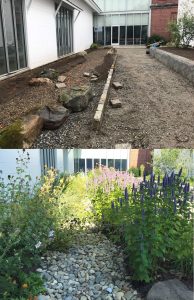
- This event has passed.
Resilient Landscapes in Built Environments: Plants and Practices (Sold Out)
November 26, 2024 @ 9:30 am - 3:00 pm

We’re sorry this event is not available. Occasionally, we have cancellations throughout the year. If you’d like to hear first when a spot opens, please fill out the form at this link: https://forms.office.com/r/r3tuA91Cds
This form does not guarantee a spot at the event.
//
Tuesdays, November 26, Dec. 3, 10 & 17
Tailored to emerging or current professionals in the green industry, Plants and Practices guides students through the valuable process of landscaping with native plants and working in harmony with nature to achieve high-performing, resilient landscape systems. The four-part course features detailed instruction about native woody plants and native herbaceous plants for specific environmental applications; instruction and discussion about effective implementation and long-term management practices for various projects; and how to establish comprehensive, functional, and successful communication between clients and contractors. We will discuss biodiversity in plant communities, plant adaptation, successional design and growth, erosion control, installation of green infrastructure, building trust and establishing landscape programs that include long-term management and design, and much more. These interactive virtual sessions will help native-plant-savvy students plan for the next level of design and management.
Class Level: Advanced
Native Woody Plants
Instructor: Andy Brand, Director of Horticulture, Coastal Maine Botanical Gardens
Explore an extensive selection of native woody plants, from rare to common to under-used species, those that are versatile and those that are site-specific. Andy will discuss straight species versus cultivated and how they’re used in designed resilient landscapes. Instruction will include:
- Sourcing and cultivation
- Evaluating and selecting woody plants appropriate for specific built landscapes
- Appreciating woody plants, individually and communally, that contribute to habitat and structure to the year-round landscape
Native Herbaceous Plants
Instructor: Heather McCargo, Founder, Wild Seed Project
Examine a range of native herbaceous plants, such as those thriving in versatile conditions and those preferring specific cultural conditions, all of which lead to healthier ecological landscapes. Class content will cover:
- Trends in the native plant nursery trade
- Wildlife benefits
- Project testimonials
- Seasonal planting and management methods according to species’ habits and successional growth
- Visual aesthetics for seasonal appeal.
Sustainable Implementation Practices
Instructors:
Trevor Smith, landscape contractor, designer, and Manager of Design and Education at Weston Nurseries in Massachusetts.
Larry Weaner, Lead Garden Designer and Founder of Larry Weaner Associates, author of Garden Revolution, and Founder of New Directions in American Landscapes.
This session will examine big and small, new and existing landscape settings, including green infrastructure, meadow-scapes, woodlands, and wildlife gardens. Sustainable implementation practices evaluate how, who, with what, and when it is appropriate to do the work while considering environmental or economic variables. Weaner and Smith will share:
- Extensive knowledge of how they bring designs to life
- Considerations and practices of evolving systems
- How to examine environmental factors
- Available resources
- Plant selection
- How to design or implement over a successional timeline
Contractors and Clients in Unison
Instructors:
Trevor Smith, landscape contractor, designer, and Manager of Design and Education at Weston Nurseries in Massachusetts.
Larry Weaner, Lead Garden Designer and Founder of Larry Weaner Associates, author of Garden Revolution, and Founder of New Directions in American Landscapes.
Expanding on Sustainable Implementation Practices, the final discussion focuses on communication and business practices. From employees to sub-contractors, clients, and specialty consultants, working with a network of professionals is necessary to ensure successful results. Just as the entire program highlights the matrix within landscapes, this work takes a matrix of people. With confidence in these practices, processes, and goals, you will have the confidence to explain and communicate with your clients, employees, and any network contractors about ecological, high-performing, and resilient landscapes. Through applied case studies, students will learn how to:
- Coordinate seasonal schedules
- Manage resources and personnel
- Communicate ideas and methods
- Collaborate effectively by listening to other industry professionals
